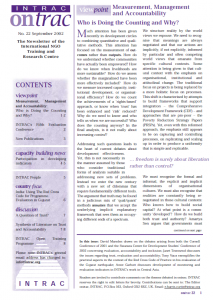 Much attention has been given recently in development circles to combining quantitative and qualitative methods. This attention has focused on the measurement of outcomes rather than outputs. How do we understand whether communities have actually been empowered? How do we know when livelihoods are more sustainable? How do we assess whether the marginalised have been more effectively included? How do we measure increased capacity, institutional development, or organisational efficiency? How do we count the achievements of a ‘rights-based’ approach, or know when ‘trust’ has been enhanced and ‘risk’ reduced? Why do we need to know and who tells us when we are successful? Who does the counting anyway? In the final analysis, is it not really about increasing control?
Much attention has been given recently in development circles to combining quantitative and qualitative methods. This attention has focused on the measurement of outcomes rather than outputs. How do we understand whether communities have actually been empowered? How do we know when livelihoods are more sustainable? How do we assess whether the marginalised have been more effectively included? How do we measure increased capacity, institutional development, or organisational efficiency? How do we count the achievements of a ‘rights-based’ approach, or know when ‘trust’ has been enhanced and ‘risk’ reduced? Why do we need to know and who tells us when we are successful? Who does the counting anyway? In the final analysis, is it not really about increasing control?
In this issue, David Marsden draws on the debates arising from both the Cornell Conference of 2001 and the Swansea Centre for Development Studies’ Conference of 2002 concerning evaluation, accountability and inclusion; Janet Townsend discusses the issues regarding trust, evaluation and accountability; Tony Vaux exemplifies the practical aspects in the context of the Red Cross Code of Practice in his evaluation of the Gujarat earthquake; and Anne Garbutt discusses development of monitoring and evaluation indicators in INTRAC’s work in Central Asia.
Download:
ONTRAC 22. Measurement, management and accountability
.pdf (0.11mb)
Download:
ONTRAC 22. Measurement, management and accountability. French
.pdf (0.07mb)